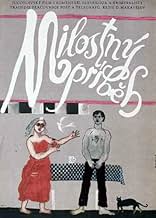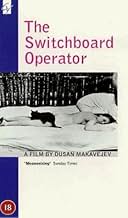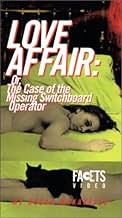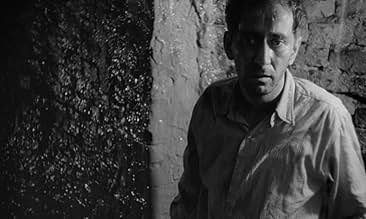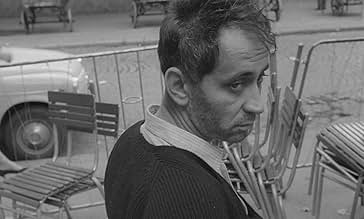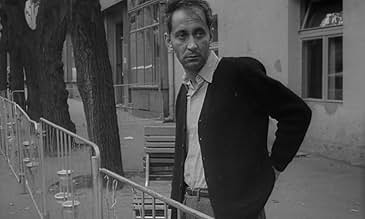VALUTAZIONE IMDb
7,3/10
2023
LA TUA VALUTAZIONE
Aggiungi una trama nella tua linguaA young female starts a love relationship with a serious young man. However, while he is away on business, she gets lonely and succumbs to her colleague's desires.A young female starts a love relationship with a serious young man. However, while he is away on business, she gets lonely and succumbs to her colleague's desires.A young female starts a love relationship with a serious young man. However, while he is away on business, she gets lonely and succumbs to her colleague's desires.
- Regia
- Sceneggiatura
- Star
Aleksander Kostic
- Ekspert za seksualna pitanja
- (as Dr Aleksandar Dj Kostic)
Zivojin Aleksic
- Ekspert za kriminalistiku
- (as Dr Zivojin L Aleksic)
Dragan Obradovic
- Obducent
- (as Dr Dragan Obradovic)
Recensioni in evidenza
This is not only a great little movie, but also a great time-capsule of late-'60s Yugoslavia (a nation since destroyed by way of violent imperialist intervention).
A young Hungarian woman and an older, Serbian man enter into a relationship under the internationalist, multi-ethnic, mid-twentieth century culture of communist Yugoslavia. This work contains scenes of beautiful, deeply moving, intimacy and sexuality.
The contradictions of this culture are made plain within the movie by reference to scenes from a Russian revolutionary film by Dziga Vertoz: Committed communist masses dismantle an old Cathedral- their cause is clearly popular and democratic, yet it is intolerant of an institution that has itself embodied intolerance for millennia. "Revolutionary", "scientific" humanity remains constellated within a dialectic of resentment.
Ultimately, human frailty destroys both the Hungarian and the Serbian. Misunderstanding and jealousy cause the lovers to turn on, and destroy, each other within the the terms set forth by this "revolutionary" society. Progress creates the illusion of enlightenment. But ultimately it is human nature that decides our fate.
This outlook ultimately qualifies writer-director Dusan Makavejev as a philosophical reactionary, albeit an exceptionally creative one.
A young Hungarian woman and an older, Serbian man enter into a relationship under the internationalist, multi-ethnic, mid-twentieth century culture of communist Yugoslavia. This work contains scenes of beautiful, deeply moving, intimacy and sexuality.
The contradictions of this culture are made plain within the movie by reference to scenes from a Russian revolutionary film by Dziga Vertoz: Committed communist masses dismantle an old Cathedral- their cause is clearly popular and democratic, yet it is intolerant of an institution that has itself embodied intolerance for millennia. "Revolutionary", "scientific" humanity remains constellated within a dialectic of resentment.
Ultimately, human frailty destroys both the Hungarian and the Serbian. Misunderstanding and jealousy cause the lovers to turn on, and destroy, each other within the the terms set forth by this "revolutionary" society. Progress creates the illusion of enlightenment. But ultimately it is human nature that decides our fate.
This outlook ultimately qualifies writer-director Dusan Makavejev as a philosophical reactionary, albeit an exceptionally creative one.
Early on in his wildly experimental career, Dusan Makavejev was proving himself to be one of world cinema's most unique talents. With his brilliant, genre bending masterpiece "Love Affair", he crafts a simplistic, beautiful, and devastating portrait of one of film history's most tragic romances. Of course, Makavejev's vision is not limited by the boundaries of conventional storytelling and tone. Spliced in between the romantic tragicomedy are interviews with a sexologist and a criminologist, as well as various bits of stock footage depicting Yugoslavian politics.
This often weird and humorous version of a brutally sad tale is among my new favorite films thanks to its entertainment value, stunningly unique vision, wild sense of humor, and strong emotional impact. Makavejev pulls no punches, he allows the tragedy to burst in a chaotic explosion of tears, refusing to hold back. By the end, i was so struck with melancholy that I could hardly believe what I had just witnessed. This is a film that combines so many themes and genres, and yet manages to portray a semi-tradition story that anyone can follow. Sprinkling bits and pieces of the charmingly surreal and avant garde all over this saddening love story, Makavejev forms one of the finest, most unfortunately underrated and obscure cinematic romances of all time.
This often weird and humorous version of a brutally sad tale is among my new favorite films thanks to its entertainment value, stunningly unique vision, wild sense of humor, and strong emotional impact. Makavejev pulls no punches, he allows the tragedy to burst in a chaotic explosion of tears, refusing to hold back. By the end, i was so struck with melancholy that I could hardly believe what I had just witnessed. This is a film that combines so many themes and genres, and yet manages to portray a semi-tradition story that anyone can follow. Sprinkling bits and pieces of the charmingly surreal and avant garde all over this saddening love story, Makavejev forms one of the finest, most unfortunately underrated and obscure cinematic romances of all time.
What I enjoyed most about this inexplicable Yugoslavian film was the source of pleasure in watching a movie filmed on grainy, imprecise celluloid stock. Every scene hums with that lovely old-fashioned atmosphere of maddeningly strenuous traditional film-making. We can sense the boom mikes, the film reel, the guys with big, uncomfortable headphones, and the director with a big vision that frustrates him by communication breakdown, as the outcome of his film is a bewilderingly ambiguous celluloid mishmash of sex, young lovers, totalitarian Yugoslavia, and nonlinear narrative structure.
And as such, it is a joy! It splurges and has fun! In one hour and nine minutes, its main thread, concerning a Hungarian switchboard operator who meets and falls in love with a Muslim who soon moves into her apartment much to the jealous chagrin of an imposing postal worker, intruding some touching intercuts of archive footage that give impressions of lives ensnared in totalitarian society, a brief history of how the gray rat infested Europe, and a sexologist in his study talking about the history of sex. Even the central train of thought is deconstructed into ambiguity as, seemingly at the same time, the police are investigating the drowning of a young woman.
Director Dusan Makavejev seems to have simply made a multi-faceted montage of Yugoslavia and reflections based on its time, 1967. In spite of its self-indulgence, as was a common limitation of progressive European art-house films of the time, it is very enjoyable.
And as such, it is a joy! It splurges and has fun! In one hour and nine minutes, its main thread, concerning a Hungarian switchboard operator who meets and falls in love with a Muslim who soon moves into her apartment much to the jealous chagrin of an imposing postal worker, intruding some touching intercuts of archive footage that give impressions of lives ensnared in totalitarian society, a brief history of how the gray rat infested Europe, and a sexologist in his study talking about the history of sex. Even the central train of thought is deconstructed into ambiguity as, seemingly at the same time, the police are investigating the drowning of a young woman.
Director Dusan Makavejev seems to have simply made a multi-faceted montage of Yugoslavia and reflections based on its time, 1967. In spite of its self-indulgence, as was a common limitation of progressive European art-house films of the time, it is very enjoyable.
That European cinema did things differently in the 1960s is not in doubt, as even directors from little-renowned cinematic cultures such as Yugoslavia delighted in new-found freedom. On one hand, "Switchboard Operator" is a simple tale of love, betrayal and tragedy in Belgrade, and as such captures some touching details about trapped lives in a totalitarian society. However, director Dusan Makavejev, clearly under the influence of Godard, adopts an offhand approach to his narrative, and introduces extraneous material at tangents to the main story. Most of this stuff is fascinating, particularly when he uses archive footage of Yugoslav history. Less successful are the interjections of two tedious academics, a sexologist and a criminologist, whose stern pronouncements jar against the film's capricious tone. Nonetheless, this is invigorating film-making which reaches into some strange regions. Despite an economical running time of 69 minutes, the film even finds time for a brief history of how the grey rat infested Europe!
To me, the story is lousy and boring, and dialogues, monologues and narrators are catastrophic. The only thing worth seeing in this movie is Eva Ras. She was really pretty girl in her youth, and this is the first Yugoslavian film with explicit nakedness. The scene in which the black cat is lying on Isabel's naked body is known not only within domestic but also the world cinematography.
3/10
3/10
Lo sapevi?
- QuizThe film was initially refused a UK certificate by the BBFC owing to shots of pubic hair, though the distributor himself partly ruined its chances by ignoring the film's creative aspects and instead telling censor John Trevelyan "I am sending you a film with a few tits in it. I don't think much of it but I can sell it to the sex theaters". It was eventually passed with minor cuts in 1969 and released fully uncut on video in 1996.
- ConnessioniFeatured in Zabranjeni bez zabrane (2007)
I più visti
Accedi per valutare e creare un elenco di titoli salvati per ottenere consigli personalizzati
Dettagli
- Data di uscita
- Paese di origine
- Lingue
- Celebre anche come
- Love Affair, or The Case of the Missing Switchboard Operator
- Azienda produttrice
- Vedi altri crediti dell’azienda su IMDbPro
- Tempo di esecuzione1 ora 19 minuti
- Colore
- Mix di suoni
- Proporzioni
- 1.66 : 1
Contribuisci a questa pagina
Suggerisci una modifica o aggiungi i contenuti mancanti

